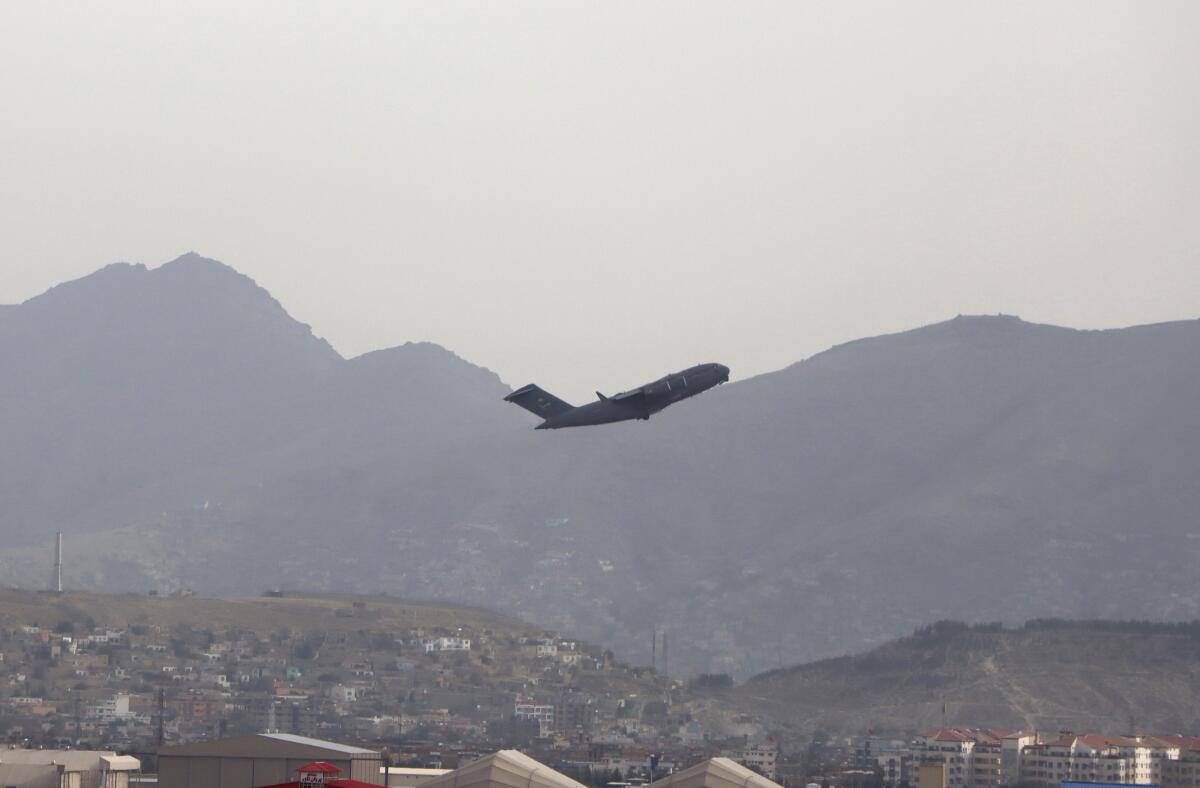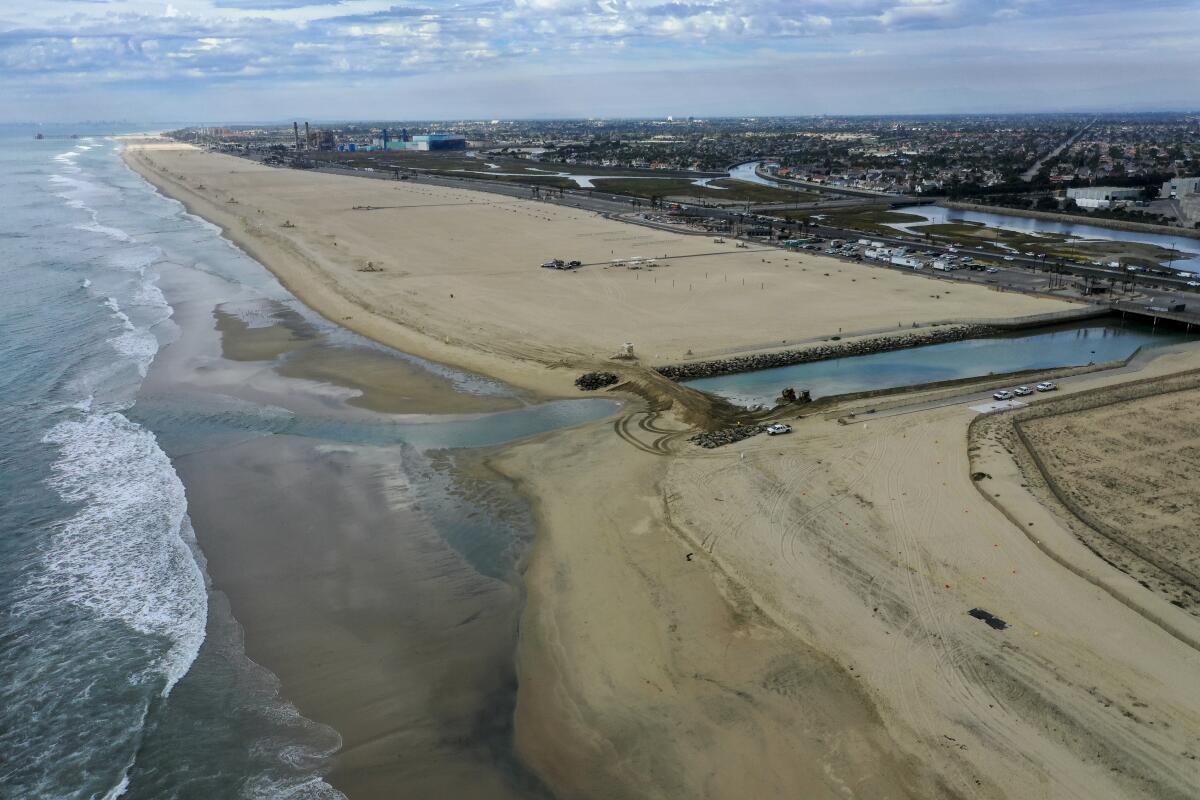There are California students still stuck in Afghanistan after the Taliban takeover

- Share via
Good morning, and welcome to the Essential California newsletter. It’s Wednesday, Oct. 6. I’m Justin Ray.
In August, as the Biden administration began what would become a chaotic withdrawal from Afghanistan, we learned that some California students and their families were stuck in the country.
San Diego County students who had been unable to flee first made headlines. Then, it was discovered that Sacramento-area students were in the same predicament. The last U.S. planes departed around midnight Aug. 30, though not every American citizen was able to make it aboard.
Although the San Diego students’ situation was the most discussed, there appear to be more students from around Sacramento still in Afghanistan. The situation is ever-changing, but here’s what I was able to find out about the remaining students:
Sacramento-area students
There are dozens of Sacramento-area families still in the country, according to the San Juan Unified School District. Recently, three families — including seven students — made it back to the U.S. But about 38 students are still there.
“We continue to remain hopeful of their safe return soon,” Raj Rai, director of communications for the school district, told me last week.
The nearby Sacramento City Unified School District told The Times that an Afghan immigrant family with three children enrolled at Ethel I. Baker Elementary sought help in fleeing. The students have not yet returned to the school.
“We are closely working with our congressional representatives, and appreciate their tireless efforts to help these students and their families,” Sacramento City Unified Supt. Jorge A. Aguilar said in a release. “We remain hopeful that our students will soon be able to safely leave Afghanistan, come home to the U.S. and return to school in Sacramento.”
San Diego-area students
Rep. Darrell Issa (R-Bonsall) — who has been very critical of the Biden administration on social media — has aided in coordinating evacuations. His spokesperson Jonathan Wilcox gave The Times a statement about a parent and four students from the Cajon Valley Union School District who remain in Afghanistan:
“We are tracking one remaining El Cajon family unit, and it includes El Cajon schoolchildren. We’ve provided their names, documents and other detailed information to the State Department on numerous occasions [emphasis his] — as well as discussed them with [the State Department] repeatedly. Congressman Issa and his team continue to press official channels including State, DOD, DHS, and the White House on a daily basis.”
A State Department spokesperson told The Times: “We have assisted 105 U.S. citizens and 95 lawful permanent residents (LPRs) to depart Afghanistan. These are the numbers of people whose individual departures we directly facilitated.”
Regarding Wilcox’s comment, the spokesperson said that “due to privacy considerations, we are unable to comment on specific cases. We are first focusing on U.S. citizens with immediate family members who are ready to depart and have travel documents. We will then more intensively focus on the subset of U.S. citizens with immediate family members for whom documentation has been an issue, to find ways to assist them.”
And now, here’s what’s happening across California:
Note: Some of the sites we link to may limit the number of stories you can access without subscribing.
L.A. STORIES
The latest on the O.C. oil spill

On Tuesday, officials frantically tried to protect ecologically sensitive shorelines. Oil continued to move south after fouling beaches and wetlands in Huntington Beach. The spill was initially estimated at about 126,000 gallons of crude, but late Monday, state and federal officials said that number could be closer to 144,000 gallons.
Who knew about the Orange County oil spill and when? Those are some of the questions at the heart of demands from local officials looking for transparency. We now know that officials first learned a slick was likely Friday night, even though the public wasn’t informed about the leak until the following evening.
Other stories:
The story of L.A.’s oddball flag ... Wait, L.A. has a flag? You’ve probably seen it without even registering what you were seeing: a flag of three vertical bands of color with sawtooth borders between, and some round fancy thing in the middle that’s indecipherable when you’re standing on the ground and the flag is flapping away 20 or 30 feet in the air. Pat Morrison tells the story behind the official flag of the city. Los Angeles Times
Our daily news podcast
If you’re a fan of this newsletter, you’ll probably love our new daily podcast, “The Times,” hosted by columnist Gustavo Arellano, along with reporters from across our newsroom. Every weekday, it takes you beyond the headlines. Subscribe on Apple Podcasts and follow on Spotify.
POLITICS AND GOVERNMENT
California cities are fighting over tens of millions of sales tax dollars their residents pay when buying from Amazon and other large retailers. Currently, cities with distribution centers receive the money. But Rancho Cucamonga city leaders have proposed a resolution that would result in online sales tax revenue being distributed among cities where packages are delivered, rather than where distribution centers are located. The city of Fresno, which has a lot of those centers, calls one plan “racist.” Fresno Bee
Gov. Gavin Newson vetoed a bill impacting farmers in the state. Assembly Bill 616 would have made it easier for farmworkers to vote to unionize by allowing them to fill out and mail ballots as absentees, just as voters do in a general election. “Why was the absentee ballot process good for the governor when he depended on it to defeat the recall, but not good for farmworkers?” asked Teresa Romero, president of United Farm Workers. Newsom, in a veto statement, said he “has worked tirelessly to protect and support workers across California.” However, he added, “this bill contains various inconsistencies and procedural issues related to the collection and review of ballot cards.” Capital and Main
CRIME AND COURTS
In a California desert, sheriff’s deputies settle schoolyard disputes. Black teens bear the brunt. According to data that California law enforcement agencies are required to publish under the terms of a law aimed at combatting racial profiling, sheriff’s deputies in the Antelope Valley have disproportionately detained and issued citations to Black teens on public school campuses. An analysis by KPCC/LAist and ProPublica found that Black teenagers accounted for 60% of the deputy contacts on campuses but made up only about 20% of the enrollment in those schools. Propublica
Support our journalism
HEALTH AND THE ENVIRONMENT
Death threats, violence, intimidation mark another pandemic school year. Just before school started, things looked bright: coronavirus case numbers were down, California was reopening, and masks were coming off. But the Delta variant soon meant once again that students and teachers would have to deal with masks, testing and quarantines. It has also meant another school year of handling those who oppose such measures. We’ve heard some tough stories from educators. Los Angeles Times
CALIFORNIA CULTURE
Decades of unchecked growth in the California hospice industry will come to a halt Jan. 1, when a moratorium on new licenses takes effect. Two bills aimed at reforming the industry come after a Los Angeles Times investigation of the state’s booming hospice business. Gov. Gavin Newsom signed the bills into law Monday. An extensive examination by the state auditor also is underway to identify deficiencies and recommend improvements to hospice licensing and oversight. Los Angeles Times
Lisa Ling’s CNN series ‘This Is Life’ explores painful historic moments. One is personal. Ling knows that criticism and angry comments from the public come with the territory. But she was taken aback by the viciousness of the remarks she saw last year when the country was shut down by the COVID-19 pandemic. “The day after Donald Trump called COVID the ‘China virus,’ I got two messages on social media that told me my people were responsible for it,” Ling says. Ling grew up in Carmichael, a suburb of Sacramento. When she saw how similar rhetoric led to a staggering surge in the number of attacks on Asian Americans in the state, she decided to act. Los Angeles Times

Free online games
Get our free daily crossword puzzle, sudoku, word search and arcade games in our new game center at latimes.com/games.
CALIFORNIA ALMANAC
Los Angeles: Make some fried ribs! 74 San Diego: 72 San Francisco: See reporter Kevin Rector’s cat get confused about the storm in L.A. 65 San Jose: 70 Fresno: Plan on cleaning? Get help from a puppy. 79 Sacramento: 76
AND FINALLY
Today’s California memory is from Carol Bartlett:
In the 1950s, we played in the acres of orange groves in the O.C. Periodically, the ranchers irrigated by flooding the furrows between the rows of trees, and it took 3 or 4 days for the water to percolate into the ground. Whoopee! We sloshed barefooted through “canals” of thick, knee-deep mud, pretending we were exploring jungles & alert for lurking crocs & gators. Leaving our jungle, we’d surreptitiously hose off at the first house we came to with a garden hose in front.
If you have a memory or story about the Golden State, share it with us. (Please keep your story to 100 words.)
Please let us know what we can do to make this newsletter more useful to you. Send comments to essentialcalifornia@latimes.com.
Sign up for Essential California
The most important California stories and recommendations in your inbox every morning.
You may occasionally receive promotional content from the Los Angeles Times.







